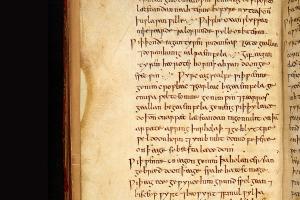
Does this ancient text have the answer to the plague of MRSA – maybe – but probably not.
It sounds like a witches brew. A salve made with leeks, garlic, bile, and ancient wine. Turns out it is effective against a modern super bacteria we call MRSA. Did the ancients know more about medicine? Is a 1000-year-old salve that kills the highly antibiotic resistant MRSA proof that there was some ancient knowledge? Can this potion provide treatment for a bug that kills over 20,000 patients per year in US hospitals?
So here is the rest of the story:
This “potion” was tested on mouse skin and it killed 90 per cent of the MRSA found on mouse skin. But can we inject this ancient potion (and will it have an effect if we do?) The answer is no.
Local control of infections, on the surface, can be done with a variety of salves that we have today. The issue is not just the skin or an eye infection, the issue is controlling the bacteria throughout the body, we need something we can put into an intravenous line. That is, MRSA is a bacteria that infects skin, and eyes – but it is more dangerous when it gets into the blood stream, and often just treating the skin or eye is not enough.
What can be done in a laboratory on mouse skin is different than what can be done by a bug infecting live tissues of humans. When it comes to treating skin with MRSA, in for example, burn wounds, there are a variety of topical agents effective against MRSA. Those topical agents are easily manufactured (some are over the counter like Neosporin, and some are only by prescription such as Silvadene)- where getting a manufacture to get cow bile might be difficult. While some think it is news that a topical ingredient is effective against MRSA note that even topical iodine is effective against MRSA.
What is effective topically is not something we can place, or necessarily should place in an IV. To effectively treat MRSA, it needs not only topical treatment in ICU patients, but it needs to be treated by through an IV, as the bacteria moves through the bloodstream.
So the ancients stumbled upon something that is now difficult to make, has no real clinical applications, and does not add to what we have. Does it prove anything? Nope. The ancients also used soap, which works well against MRSA – but the issue of antibiotic resistant bacteria is how do we treat them systemically (through an iv and the whole person) not just with local ingredients.
While we get our modern medicine on the basis of ancient remedies, remember these remedies were not all perfect. In modern medicine we purify the active ingredient, quantify the active ingredient, test it for toxicity in animals, and then begin tests in people to determine toxicity and range of efficacy.
In the meantime- keep washing your hands, and don’t try to get bile from a cow’s stomach.
This paper was first sent to the news media, it has not been subject to any review of peers, as is typically done with most studies. Always beware when someone announces something in “news” before it has been subject to the scrutiny of peers. Sadly, this potion was not studied in the eyes of people to prove it was safe or effective. I have no doubt, that right now, some supplement maker is going to put this together and sell it in your local Walmart by the summer.
